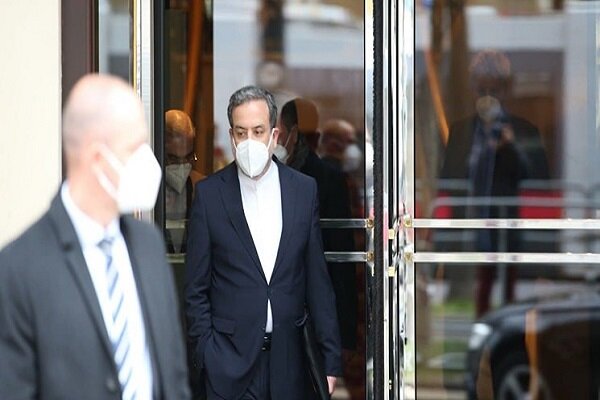U.S. must guarantee withdrawal from JCPOA won’t happen again: Araqchi

TEHRAN – A top Iranian nuclear negotiator has called on the Biden administration to ensure that withdrawal from the 2015 Iran nuclear deal and the imposition of sanctions will not happen again.
Iran’s Deputy Foreign Minister Seyed Abbas Araqchi gave more details about the latest developments of the Vienna nuclear talks aimed at reviving the 2015 Iran nuclear deal, officially known as the Joint Comprehensive Plan of Action (JCPOA). He made the remarks after a meeting of the JCPOA Joint Commission at the end of the sixth round of the Vienna talks.
Speaking to Iran’s state TV on Sunday, Araqchi said, “The sixth round of Vienna talks ended today with a meeting of the Joint Commission. At the Joint Commission meeting, we summarized a series of intensive talks that took place over the past seven or eight days. All delegations acknowledged that progress had been made fairly well and that everyone had emphasized the seriousness of continuing to work towards an agreement, but all agreed that some key issues needed to be decided by decision-makers in the countries.”
“As I have said many times in these negotiations, we pursued national goals and interests. Certainly, for both Dr. Rouhani and Dr. Raisi, what is important is that these interests be met,” Araqchi notes.
He added, “Our progress in this round has been relatively good, because a large number of texts are ready now, and the amount that is not ready has at least one very clear situation, and it shows a picture of the differences and what stage (the differences) are in, and this helps decision makers make the right decision. We have come a long way so far and we are nearing the end, but the rest of the way, as I said before, will not be an easy one.”
He noted, “I hope and I think that if the other parties can make their own decisions, God willing, we will be able to reach an agreement that we want. Our positions have not changed since the beginning of the talks, and we want all U.S. sanctions to be lifted, as well as their verification and then Iran will return to its commitments under the JCPOA.”
Araqchi also pointed to his meeting with Rafael Grossi, director-general of the International Atomic Energy Agency, calling it very comprehensive.
“The conversation I had with the Director-General of the Agency was very comprehensive, covering both this issue (the end of the one-month technical understanding between Iran and the Agency) and the remaining issues between Iran and the Agency that need to be resolved, as well as how the Agency will assist the negotiations progress. There are some technical points where the Agency's expert explanations can be helpful, and we also talked about the tasks the Agency should perform after reaching a possible agreement. The comprehensive meeting was very good.”
He pointed out, “There was a discussion about extending the technical understanding between Iran and the Agency, and this is an important issue that will be decided in Tehran, and I have no judgment in this regard.”
Araqchi also noted that he was not sure if the next round of talks would be the last one. “It is not possible to say whether the next round will be the final round or not, but I hope so. If the other side can make their own decisions, I think the next round will be the final round, but I think it will be a difficult round,” he continued.
The top Iranian nuclear negotiator stated, “As I have said many times in these negotiations, we pursued national goals and interests. Certainly, for both Dr. Rouhani and Dr. Raisi, what is important is that these interests be met. The timing [of reaching an agreement] should not matter, the sooner the better. But we will agree when we have achieved our national aspirations and the national interests and the principled and definite positions of the system that we seek have been realized. Naturally, we hope that it will be done under this government, and we hope that it will be done as soon as possible, but this is not our criterion for reaching an agreement, our criterion is to reach a good agreement.”
Araqchi noted, “It is natural that one of our serious issues in these negotiations has been and is to ensure that what the U.S. administration has done to JCPOA is not repeated, and in this regard, we need to come up with guarantees that assure us what the previous administration did, i.e. the re-imposition of sanctions and the withdrawal from the JCPOA, will not happen again. This is our natural desire and of course, it is not possible for us to return to the JCPOA without such a guarantee. This is one of our serious topics and we have reached some points in this regard, but it is one of the issues that we need to work on more.”
Diplomats from Iran and other parties to the Iran nuclear pact held a meeting on Sunday noon to conclude the sixth round of talks that have been underway since April to revive the nuclear deal.
Araqchi, who leads the Iranian negotiating team in Vienna, issued a statement about the holding of the meeting of the JCPOA Joint Commission. He said at the end of the sixth round of the Vienna talks, a meeting of the JCPOA Joint Commission chaired by Enrique Mora, the EU Deputy High Representative for Foreign Affairs and Security Policy, was held.
Araqchi, while referring to the progress made in this round of negotiations, especially regarding the draft of negotiation texts, said that the remaining important issues require serious decisions in the capitals, especially in the negotiating countries. He called on the negotiating parties to make the necessary decisions with realism, seriousness and strong will to maintain and revive the JCPOA.
